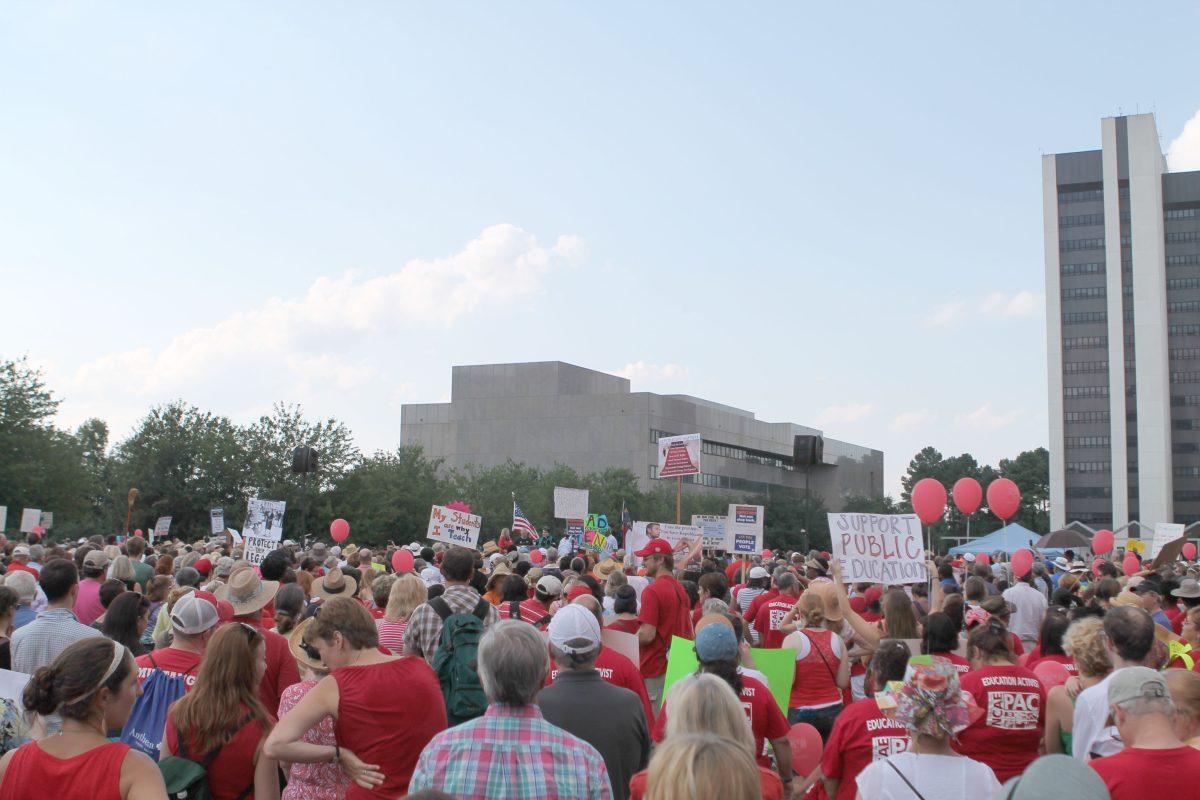“Wow,” said woman in a wheelchair as Moral Monday protestors filed past her on their way to protest at Halifax Mall at 5 p.m. Monday.
The commentary was doubtlessly referring to the size of the crowd, which the police have confirmed to contain over 5,000 people.
The protestors gathered to voice their displeasure with laws enacted by the Republican-led House and Senate during their most recent session, including ID requirements and other restrictions for voting in future elections, cuts to education, and abortion restrictions.
The protest, the 13th of its kind, took place even though legislators left Raleigh after signing the 2013-2015 state budget.
“Touch your neighbor and tell him, [lawmakers] may have run from Raleigh, but they’re going to run into me,” said Moral Monday leader Dr. William Barber II.
The budget cuts education by $120 million, eliminates teacher pay raises and tenure, cuts teachers’ assistants, and eliminates funding for programs such as North Carolina Teaching Fellows.
Gov. Pat McCrory also signed a bill on Thursday that requires abortion centers to meet the same strict standards as hospital surgical centers. Opponents said the measure could cause most of the state’s clinics to close.
The legislature also passed the Restore Confidence in Government Act on Thursday which requires voters to show government-issued photo ID cards at the polls, shortens early voting by a week, eliminates same-day voter registration during early voting, and allows any registered voter to challenge another voter’s eligibility.
Like previous Moral Mondays, the atmosphere of the final demonstration was one part church service and one part protest. Pastors and rabbis from several denominations, each representing a different area of North Carolina, offered prayers asking for divine guidance and help. Speakers expressed their confidence that their God supported them in their endeavors to gain rights for the poor, sick and marginalized.
“To every legislator who voted for a law, policy or bill that will bring harm to even one North Carolinian, we say, God of justice, have mercy,” Barber said.
The central theme of the demonstration was education. Teachers from across the state flocked to Raleigh to express their outrage with the new education restrictions, carrying signs with slogans such as, “First in flight, last in education” and “I’m a teacher, not a tester.”
Lindsay Furst, an English teacher from Asheville and a member of the North Carolina Association of Educators, spoke out against measures that she said would cause vast numbers of qualified teachers to leave the state in pursuit of better opportunities.
“Teachers are also parents and spouses and homeowners, and they need to eat,” Furst said.
So far Moral Monday been dismissed by many Republican legislators, including Gov. McCrory, as a group of malcontents and outsiders.
Sen. Thom Goolsby, chairman of the Senate Judiciary Committee, has called Moral Mondays “Moron Mondays” and described protestors as “mostly white, angry, aged former hippies.’’
“The circus came to the State Capital this week, complete with clowns, a carnival barker and a sideshow,” Goolsby wrote in a guest column published in the Chatham Journal on June 12.
However, protestors at the 13th Moral Monday remained determined that their movement can overcome what they see as regressive policies.
Speakers asserted that in protesting these policies, demonstrators at Moral Monday are continuing the work of civil rights activists like Martin Luther King Jr. and Medgar Evers.
“My ancestors killed Jim Crow. Now we’re going to kill Jim Crow’s children,” said the Rev. Andre Knight.
Barber assured the crowd that Moral Mondays are not ending, but would instead be “going on the road,” traveling from county to county in an effort to raise awareness and advocacy for the Moral Monday causes. Barber said the protestors’ first stop will be Asheville on Aug. 5.
Furthermore, every arrestee from the previous 13 Moral Mondays has pledged to register 50 voters before the November election. With more than 900 arrestees, this will create 45,000 registered voters if each arrestee can meet his or her quota, according to Barber.
“[These laws] are just temporary,” Barber said. “The only thing that is permanent is the pursuit of justice. We don’t go home to weep. We go home to work.”








